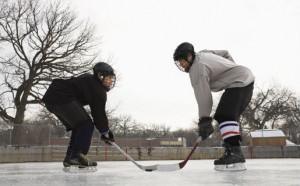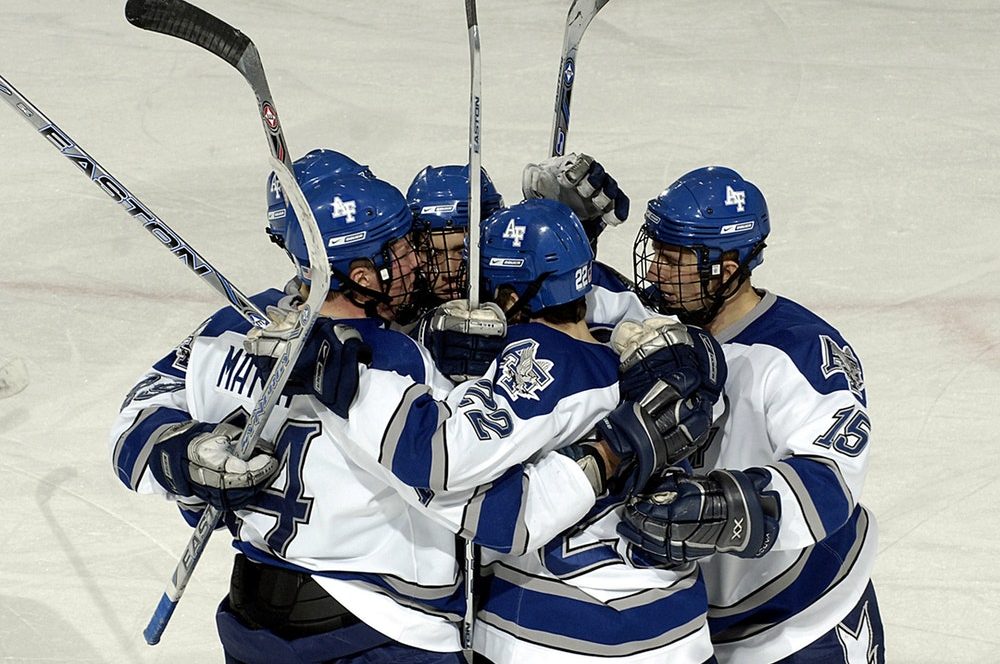
It might be Canada’s unofficial national sport (after lacrosse…) but hockey can cause parents a ton of stress. And we’re not talking about Stanley Cup Playoff season. Early mornings, expensive equipment and growing children can mean a winter season filled with budgetary demands for families. Fortunately there are a few options for parents. Applications are now open for Hyundai Hockey Helpers, a program entering its second year. The program provides grants to help under-resourced Canadian families get their kids in the game and they’ve partnered with Montreal Canadiens defenceman P.K. Subban and his father Karl to help spread the word.
UrbanMommies was given the special opportunity to interview Karl Subban, a former school principal and hockey dad, with a few pressing questions from parents whose kids love the good ol’ hockey game.
1. Our family spent a chunk of the summer making playtime and family time a priority. It was tough! When a child is focused and enmeshed in one activity and wants to be at the top of their sport, how do you pull them away from it?
It’s wonderful to see a child focused on something that they love. It also teaches them focus and self-control, two necessary ingredients for success and high achievement.
However, parents must take an active role in creating balance. Schedule family time and time to play. The younger the child, the more involved parents should be in those activities. Parents should also lead by example. Demonstrate the balance you want to see in your children. If your children see you devoting all of your time to work or one pursuit, this will influence them to do the same.
2. I love your advice about rewarding effort and milestones instead of the wins. Could you name a few hockey milestones that parents might encourage and watch for in their children?
Celebrate the day your child truly develops a passion for the game – the day they want to go to practice, the day they can’t wait to get those skates on. For some kids, it comes automatically. For others, it takes time.
The drive to get involved with the game is a big milestone. My sons PK and Jordan wanted to get right in the game from the start, while Malcolm did not want to chase the puck. We celebrated the day his eyes lit up and he truly got into the game with his team.
Some milestones are harder on parents, like the day kids want more independence. But I look at it this way – I’ve set them on the right the path. The rest is up to them.
3. What advice do you have for the parent whose child thinks they want to play and then gets discouraged or wants to quit halfway through the year?
Kids love attention and praise, so we need to make sure that those two ingredients are there in plenty. It raises their self esteem and confidence. A lack of those two things can be the reason why they are discouraged.
If they are discouraged, ask them why they don’t want to play anymore. Are they having fun? Are they being praised and feeling confident? Is someone on the team bullying them? Do they wish they could have time to devote to other activities? Find the root cause so you can help them achieve a balance, and see if there are any larger issues. It could be a complex problem, or as simply as switching their position on the team.
Kids get turned off if they aren’t having fun, and the biggest barrier I’ve seen is when the playing and practicing balance is off. At a younger age, they should be playing more than practicing. This balance can shift as a child grows.
You should also take the time to explain that a new skill is difficult, but rewarding. If they get used to quitting when the going gets tough, it will be hard for them to stick to any activity and develop their skills.
4. You are an accomplished educator and also the father of a hockey pro. I loved that one of your recommendations for kids is to teach them to give back. How did you encourage P.K., Malcolm and Jordan to give back when they were young?
Parents have to model the behavior and encourage the whole family to get involved. At our school, our family always participated in our local food bank program.
I also encouraged to them to show gratitude to important people in their life through small gestures. At the end of the year, our sons would select a small gift for their hockey coach. It was usually just a new whistle, but the small token and a thank you card means a lot. My son PK continues to be heavily involved in the community at a grass-roots level, from the Hyundai Hockey Helpers program to visiting local schools.
5. The Hyundai Hockey Helpers program is such a boon to the industry and Canadian families in need. You put three boys through hockey and made many sacrifices. Do you have tips for parents in addition to the grants that are offered as to how they can ease the financial burden of getting their kids involved in hockey?
The cost of hockey grows along with your child. There are steps that parents can take to minimize costs in the early stages of the game, from purchasing wooden sticks instead of composite, to carpooling with other families.
Outdoor rinks were a financial savior for me and my boys. Outdoor rinks and public skates cost little and are a great way to get ice time cheaply or for free. We also purchased used equipment to help further reduce our costs.
If you have two or more kids, ask your local hockey association if they can offer you a discount, they often will. It’s also common for them to assist with goalie equipment in the minor leagues.
Finally, get your kids working when they are old enough! It will teach them the value of a dollar and ease the financial burden on the family. PK worked at hockey schools, teaching drills and setting pylons.
Additional Tips:
- Kids need balance. While long drives to tournaments and early morning practices can be overwhelming, it’s important to include family and play time. A child overwhelmed with a demanding schedule may soon lose his or her passion for the game.
- Kids need direction. Let your kids know why they are participating in an activity. Not only are they gaining skills to be a better player, but they are gaining the skills to be a better person, including confidence, teamwork, and communication. And most of all, they are playing to have fun.
- Motivate by rewarding effort, not wins. It’s easy to take your child out for an ice cream if they win a game, but it means more to celebrate milestones achieved through hard work and perseverance.
- Remind children that they get better over time, not over night. Kids can get frustrated when they don’t feel they are making progress. Maintaining current skills is an accomplishment, and those tiny, incremental improvements are leaps and bounds for children.
- Keep them fueled. Aim for balanced meals, but don’t obsess over nutrition. Kids can be picky. Try feeding them like a professional athlete and you will fight a losing battle. Remember, even pancakes (our family favourite) have protein-rich milk and eggs.
- Be an active listener. You want to influence young people, but more importantly you want to inspire them. Listen to your child’s subtle cues.
- Teach kids the importance of giving back from a young age. Regardless of socio-economic status, all kids can give back. Whether it’s giving up a seat on public transit to someone in need or holding a door, small acts of kindness can go a long way to instill the values that ultimately make a great hockey player.
- It truly does take a village to raise a child, so don’t be afraid to ask for help. Organize a car pooling schedule for your team. If finances are an issue, there are organizations that can help for almost every sport. Hockey parents in need can visit HyundaiHockey.ca to confidentially apply for grants for equipment and registration fees.

